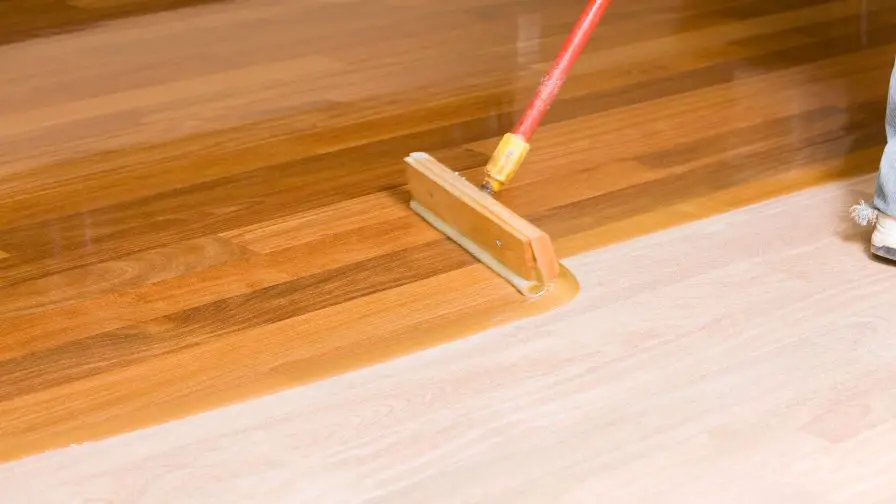
Is water-based varathane any good? This is a question from many people lately. There seems a lot of debate over whether or not water-based varathane is better than oil-based. In this blog post, we will explore the pros and cons of both types of varathane and help you decide which one is right for you.
Is Water-Based Varathane Any Good?
Yes, they are every bit as good – provided you follow the manufacturer’s guidelines. The development of water-based finishes has been greater in recent years. They now offer the same durability and protection as oil-based finishes. But with the added benefit of being much easier to work with.
When you’re looking for a water-based finish that will give your project the same protection and durability as an oil-based finish, Varathane is a great option!
While it’s not the only water-based finish on the market, it’s one of the most popular, and for good reason. Varathane is easy to apply, dries quickly, and provides a beautiful and long-lasting finish.
What Is Water-Based Varathane?
Water-based Varathane is a type of polyurethane that is specifically designed for use on wood surfaces. It is a clear and water-based finish that protects from moisture and UV damage while still allowing the natural beauty of the wood to shine through. The selection has both gloss and satin finishes.
Consider water-based Varathane for both indoor and outdoor projects. It is durable and long lasting, yet easy to apply and clean up. Plus, it has very little odor compared to other types of polyurethane.
Give it a try on your next project! It won’t disappoint.
Subscribe to Jen Woodhouse on YouTube
Pros And Cons Of Water-Based Varathane
Water-based polyurethane is one of the most favored finishes for hardwood floors! So it is important to consider the pros and cons of water-based finishes before deciding on your floors.
Pros:
– Easy to apply
– Dries quickly
– Non-toxic
– Low odor
– Cleans up with water
Cons:
– Can raise the grain of some woods
– Susceptible to scratches and scuffs
If you are considering a water-based finish for your hardwood floors, it is important to keep these pros and cons in mind. Weighing the pros and cons will help you make the best decision for your floors!
Pros And Cons Of Oil-Based Varathane
Pros:
-dries quickly
-great for indoor projects
-provides a smooth, durable finish
Cons:
-smells bad
-toxic fumes
-hard to clean up
Which Type Of Varathane Is Right For You
There are three main types of Varathane: water-based, oil-based, and gel. Each has its advantages and disadvantages. So it’s essential to select the suitable one for your project.
Water-based Varathane is the most versatile type. It can suit wood, metal, or plastic, making it ideal for a wide range of projects. However, it isn’t as durable as the other types and can chip or scratch more.
Oil-based Varathane is more durable than water-based. Use it for high-traffic areas or surfaces that will see a lot of wear and tear. It will also chip or scratch less. However, it has a strong odor and takes longer to dry.
Gel Varathane is the most durable type. It’s perfect for surfaces that will see a lot of use, such as countertops or table tops. It’s also heat resistant, making it ideal for kitchen projects. However, it is difficult to apply and takes longer to dry.
What Is The Main Disadvantage Of Using Water-Based Polyurethane?
There are a few disadvantages to using water-based polyurethane over oil-based. One of the main disadvantages is that it takes much longer to cure. Water-based polyurethane can take anywhere from 24 to 72 hours to fully cure, whereas oil-based polyurethane only takes about eight hours. This can turn into a bit of a pain when you’re trying to do a quick project.
Another disadvantage of water-based polyurethane is that it gets tricky to apply. It’s important to follow the instructions on the can carefully. Otherwise, you might end up with a sticky and uneven finish. Since it takes so long to cure, you have to show caution not to smudge it while it’s drying.
Despite these disadvantages, water-based polyurethane is still a great option for many projects! It only takes a little more time and effort to get the job done right. But in the end, you’ll have a beautiful and durable finish that will last for years to come.
Which Is Better Water-Based Or Oil-Based Polyurethane?
The debate between water-based and oil-based polyurethane has been around for some time. Each type of polyurethane has its own set of advantages and disadvantages. Water-based polyurethane is easier to apply, while oil-based polyurethane provides a more durable finish. Here’s a closer look at each type of polyurethane, to help you decide which is the best option for your project.
Water-based polyurethane has water as the primary solvent. This type has a low odor, can clean up with water, dries quickly, and has a shorter curing time than oil-based polyurethane. You can recoat a water-based finish in two to four hours.
The main disadvantage of water-based polyurethane is that it raises the grain of the wood, which can give the surface a rough feel. Water-based polyurethane is also less durable than oil-based polyurethane.
Oil-based polyurethane has mineral spirits as the primary solvent. This type takes longer to dry, has a strong odor, and can take up to 24 hours to cure. It is more durable than water-based polyurethane and will not raise the grain of the wood.
The main disadvantage of oil-based polyurethane is that it is more difficult to apply. You also need to take extra care when cleaning up, as mineral spirits are flammable.
Subscribe to Rust-Oleum on YouTube
How Long Does Water-Based Varathane Last?
Water-based Varathane can last for up to three years when stored properly. The key to making it last is to keep it out of direct sunlight and heat. Also, reseal the container after each use. When you follow these simple tips, your water-Based varathane will give you many years of protection.
Does Water-Based Polyurethane Yellow Over Time?
Yes. However, it’s important to note that this type of yellowing is only visible in very light-colored woods. Additionally, the yellower your wood is, to begin with, the more likely it is to show through after applying a clear coat.
When you’re concerned about your project yellowing over time, you can always opt for a water-based polyurethane with an amber or beeswax finish. These finishes will darken the wood slightly, which can help to camouflage any potential yellowing.



